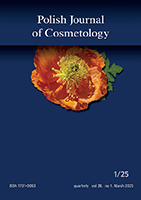search by
Copyright @ Pol J CosmetolAnalysis of the assessment of the quality of life in patients with psoriasisNatalia Hoffman, Agnieszka Garncarczyk, Agnieszka Lubczyńska, Dominika Wcisło-Dziadecka Zakład Kosmetologii, Katedra Kosmetologii, Wydział Nauk Farmaceutycznych w Sosnowcu, Śląski Uniwersytet Medyczny w Katowicach Summary Introduction. Psoriasis is an inflammatory skin disease characterized by a recurrent genetic, environmental and immunological background. Psoriasis can develop at any age, and depending on its location and course, it is divided into vulgar psoriasis, pustular psoriasis, articular psoriasis, nail psoriasis, and psoriatic erythrodemia. On the other hand, the most common psoriasis is common psoriasis, which occurs mainly in the area of the scalp and elbows and knees. Psoriatic lesions are often visible to the environment, which in turn can adversely affect the well-being and self-confidence of patients. Often the sick withdraw from social life, do not want to form closer relationships, isolate themselves from society. In the course of psoriasis, itching is not uncommon, and it can make it difficult proper sleep, and therefore patients may become tired and distracted. As a consequence, it may have a negative impact on the lives of patients, generating mood disorders, decreased professional efficiency, and even aggression. Patients with psoriasis have a much higher risk of depression and anxiety disorders than healthy people. It is not uncommon for patients to commit suicide. Aim. The aim of the study was to assess the quality of life in psoriasis vulgaris. Materials and methods. 24 patients suffering from psoriasis participated in the study. In order to determine to what extent psoriasis affects the lives of patients, the study used a proprietary questionnaire, the Dermatology Life Quality Index dermatological questionnaire. Additionally, in psoriatic patients, Beck´s test was also performed, which enables the initial diagnosis of symptoms of depression. Results and conclusions. The study using the DLQI questionnaire showed that 87.5% of patients have a reduced quality of life due to psoriasis. On the other hand, the analysis of Beck Depression Inventory results showed that 91.7% of the respondents were free from depressive symptoms. Key words: psoriasis, microbiome, quality of life assessment |




